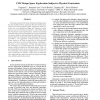Free Online Productivity Tools
i2Speak
i2Symbol
i2OCR
iTex2Img
iWeb2Print
iWeb2Shot
i2Type
iPdf2Split
iPdf2Merge
i2Bopomofo
i2Arabic
i2Style
i2Image
i2PDF
iLatex2Rtf
Sci2ools
107
click to vote
HPCA
2006
IEEE
2006
IEEE
CMP design space exploration subject to physical constraints
This paper explores the multi-dimensional design space for chip multiprocessors, exploring the inter-related variables of core count, pipeline depth, superscalar width, L2 cache size, and operating voltage and frequency, under various area and thermal constraints. The results show the importance of joint optimization. Thermal constraints dominate other physical constraints such as pin-bandwidth and power delivery, demonstrating the importance of considering thermal constraints while optimizing these other parameters. For aggressive cooling solutions, reducing power density is at least as important as reducing total power, while for low-cost cooling solutions, reducing total power is more important. Finally, the paper shows the challenges of accommodating both CPU-bound and memory-bound workloads on the same design. Their respective preferences for more cores and larger caches lead to increasingly irreconcilable configurations as area and other constraints are relaxed; rather than acco...
Related Content
| Added | 01 Dec 2009 |
| Updated | 01 Dec 2009 |
| Type | Conference |
| Year | 2006 |
| Where | HPCA |
| Authors | Yingmin Li, Benjamin C. Lee, David Brooks, Zhigang Hu, Kevin Skadron |
Comments (0)

